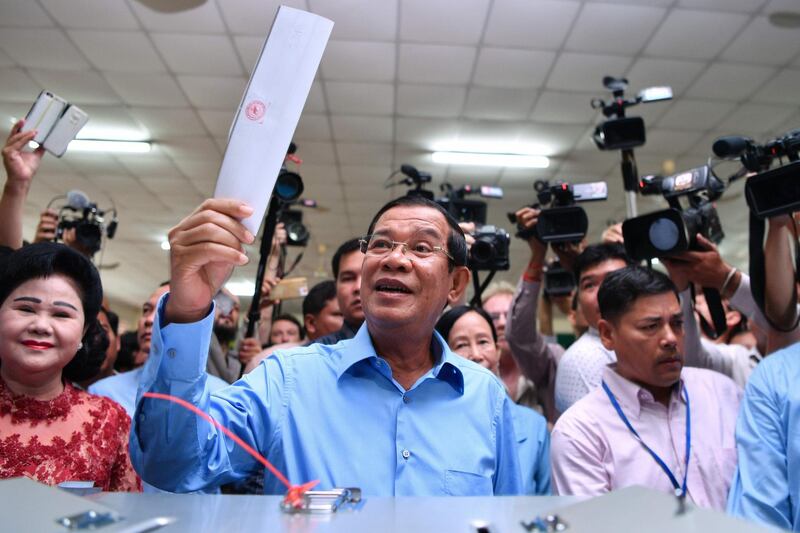Cambodia's ruling party said it had won a landslide in Sunday's election, an expected outcome after the main opposition was banned, paving the way for Prime Minister Hun Sen to prolong his 33 years in power.
Although 20 parties contested the election, the only one with the reach and ability to mount a credible challenge, the Cambodian National Rescue Party, was dissolved last year by the supreme court.
Hun Sen, who came to power in 1985 in a country still plagued by civil war, has cracked down on dissent in the run-up to this year's poll, pressuring civil society, independent media and political opponents.
That left him with little competition and no serious challengers.
Early vote counts showed his Cambodia People's Party with at least 70 per cent of the vote in all 25 provinces, with the 19 other parties far behind.
Party spokesman Sok Eysan said they expected to win "over 100 seats" in the 125-seat parliament. "The CPP will get more than 80 per cent of the popular vote," he said. "This is a huge victory for us."
Hun Sen, 65, a one-time defector from the brutal Khmer Rouge regime, has pointed to stability and growth as the fruits of his rule - a message that resonates with his base.
"Compatriots have chosen the democratic path and used your rights," he said on his Facebook page after polls closed in an apparent swipe at the opposition, which called for a boycott.
Official results are expected on August 15.
Voter turnout was 82 per cent, according to the election committee, surpassing the final figure in 2013 of roughly 69 per cent when the opposition took part.
But there were also signs of despondency and indifference, and an expert on elections in South-East Asia said the high turnout was misleading.
"With one-party rule election turnout is generally higher, not lower, because the party, in this case the Cambodian People's Party, relies on voter intimidation more, relies on vote buying more, and turnout should be inflated that way," said Lee Morgenbesser from the school of government and international relations at Australia's Griffith University.
_______________
Read more: Judge favours Cambodian exile on Facebook data demand
_______________
The Cambodia National rescue Party (CNRP) had appealed to citizens not to vote in the "sham election that has no support and is not recognised by the international community".
"I did not go to vote. I slept at home," said Khem Chan Vannak, a former commune chief elected with the CNRP. "A lot of my friends did not go to vote."
Western governments withdrew their assistance from the election, citing its lack of credibility. The 19 small or hitherto unknown parties that ran against the CPP were too obscure or new to make a meaningful difference, analysts said.
Sam Rainsy, an opposition leader who lives in self-exile in France, said the foregone election victory was a "hollow one".
The CPP has won every election since 1998.More than eight million voters registered for the sixth general election since polls were organised by the United Nations in 1993.
At the time the country was emerging from decades of war, including the Khmer Rouge years from 1975-79 which killed a quarter of the population.
Hun Sen was installed aged just 32 as national leader during the Vietnamese occupation of 1979-89.
But a youthful population angered by corruption and with little memory of the Khmer Rouge era put the ruling party's longevity in doubt.
Their votes helped the CNRP to secure more than 44 per cent of the vote in 2013 and a similar share in local elections last year.
But Hun Sen snuffed out the looming electoral threat, accusing the party of being involved in a plot to topple the government and arresting its leader Kem Sokha. The supreme court dissolved the party in November.





